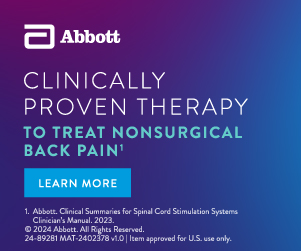AANS Neursurgeon
1118 POSTS 0 COMMENTS
Artificial intelligence is lauded for its ability to solve problems humans cannot, thanks to novel computing architectures that process large amounts of complex data quickly. As a result, AI methods, such as machine learning, computer vision, and neural networks, are applied to some of the most difficult problems in science and society.
One tough problem is the diagnosis, surgical treatment,...
A high-tech imaging study to understand how brain connectivity patterns change after deep brain stimulation in patients suffering from essential tremor has been launched at The University of Texas Health Science Center at Houston (UTHealth).
The clinical trial, led by Albert J. Fenoy, MD, associate professor of neurosurgery with McGovern Medical School at UTHealth, is funded with a $2.1 million grant...
Newsline
Handheld Device Could Someday Provide Fast, Objective Method to Diagnose Concussions in Youth Athletes
Building upon years of research, a new study from Children’s Hospital of Philadelphia (CHOP) has demonstrated how a specific assessment of the eye could someday help properly diagnosis and monitor concussions.
In the first study of its kind, the research team demonstrated that quantitative pupillary light reflex (PLR) metrics, which determine how the pupil responds to light and are obtained...
Researchers have used insight from a comprehensive genomic analysis of neuroblastoma to learn about the process driving one of the most common childhood solid tumors. The findings revealed possible approaches for developing precision medicines to improve patient outcomes. St. Jude Children’s Research Hospital scientists led the study.
The analysis involved whole genome, whole exome and whole transcriptome sequencing of 702 neuroblastoma...
Epilepsy surgery in children with refractory epilepsy, who have poor seizure control with medications, results in better outcomes, according to a study. Better outcomes with surgery include reduced antiepileptic medication use, higher rates of survival, and fewer epilepsy-related emergency department visits, fewer hospitalizations and fewer outpatient visits. The study compared the effectiveness of epilepsy surgery versus medication treatment in...
New findings from the University of Kentucky demonstrate that there may be ways to address blood-brain barrier dysfunction in epilepsy.
Epilepsy is one of the most common neurological disorders and around one-third of epilepsy patients do not respond well to anti-seizure drugs. Until now, it was believed that the cause and effect of epilepsy was merely based on a dysfunction in...
The APOE gene, the strongest genetic risk factor for Alzheimer’s disease, may play a more prominent role in disease development among women than men, according to new research from the Vanderbilt Memory and Alzheimer’s Center.
The research confirmed recent studies that carrying the allele has a greater association with Alzheimer’s disease among women compared to men, and went one step further by evaluating...
Cedars-Sinai Research Provides Insight Into Potential Health Effects of Dirty Air in the Los Angeles Basin
Prolonged exposure to particulate matter in air pollution in the Los Angeles Basin triggered inflammation and the appearance of cancer-related genes in the brains of rats, a Cedars-Sinai study has found.
While previous research has documented the association between air pollution and a variety of...
Newsline
Device Captures Vesicles Shed by Brain Tumors, Offering Patient-Specific Diagnosis and Treatment
Vesicle DNA, RNA and protein analysis can ID tumor vulnerabilities, guide treatment decisions and monitor response
Precision cancer treatment relies on obtaining molecular information about the tumor to guide effective treatment decisions. Because needle biopsies of brain tumors are invasive and difficult, bioengineers supported by the National Institute of Biomedical Imaging and Bioengineering (NIBIB) have developed micro-technologies that capture extracellular...
Patients who’ve suffered from traumatic brain injuries (TBIs) have changes in tiny blood vessels in their brains that researchers believe are linked to a range of cognitive symptoms, according to new findings. The findings may help doctors pinpoint specific types of TBIs and tailor personalized therapies.
The study was led by Ramon Diaz-Arrastia, MD, PhD, director of the Traumatic Brain Injury Clinical...





